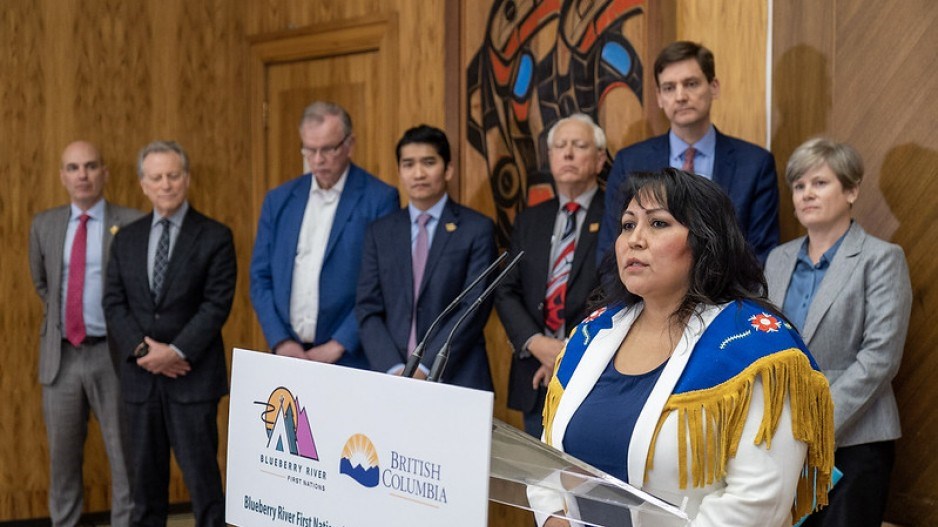A legal challenge by Treaty 8 First Nations to an agreement the B.C. government struck with the Blueberry River First Nation is adding to the uncertainty that has hung over the multi-billion dollar natural gas industry in northeastern B.C. since the summer of 2021.
That’s when the BC Supreme Court sided with the Blueberry River First Nation (BRFN) in a cumulative impacts claim.
The court found that, in permitting industrial activities – logging, road-building, oil and gas activities, etc. – the B.C. government had breached the BRFN’s Treaty 8 rights to hunt, fish and trap as they had historically done, as per Treaty 8.
The 500-member Blueberry River First Nation reached a rich deal with the province in an agreement signed between Premier David Eby and Blueberry River First Nation Chief Judy Desjarlais on January 18, 2023.
Under the deal, the First Nation will receive an $87.5 million financial package over three years and will co-manage the new Blueberry River-BC Restoration Fund, which the province will allocate $200 million towards by 2025.
This is in addition to a $65 million provincial payment to the BRFN in November 2021 to allow industrial projects to continue for six months.
The agreement sets out 650,000 hectares of high-value areas, which will be subject to restrictions on natural resource development.
In addition, the oil and gas sector will be required to pay BRFN a fee of $60,000 per hectare of new land disturbance in the designated high-value areas.
But in trying to fix the problem for Blueberry River First Nation (BRFN), the B.C. government is now impinging on the rights of other Treaty 8 First Nations whose territories overlap with BRFN -- so the First Nations are claiming in petitions to the B.C. Supreme Court.
The B.C. government responded to the 2021 court ruling with a land use agreement with BRFN in January this year – the Blueberry River Implementation Agreement -- that gives the First Nation more say over land use and resource extraction in their traditional territory, which overlaps with the territories of other First Nations that are also party to Treaty 8.
Two of them -- Doig River and Halfway River – are now going to court to challenge that agreement.
Meanwhile, it appears there has also recently been disagreement within BRFN band council itself on how provisions of the Blueberry River Implementation Agreement should be interpreted. All of which may add to investor risk for oil and gas companies operating in Northeastern B.C.
“It is a concern,” said Tristan Goodman, CEO of the Explorers and Producers Association of Canada. “It’s problematic in British Columbia right now. There isn’t sufficient certainty, and it is starting to negatively impact revenues and royalties for both indigenous nations as well as the B.C. government.”
“It brings uncertainty for the nation, too,” Chief Desjarlais told BIV News. “Once investment leaves, you have no resources coming into the community.”
Some oil and gas activity in Northeastern B.C. got put on hold between the Supreme Court decision in June 2021 and the announcement of the Blueberry River Implementation Agreement in January, 2023. The BC Energy Regulator database shows new wells drilled fell from 467 in 2021 to 374 in 2022.
“Some of that is attributable to the lack of certainty on permitting,” Goodman said.
In a Sept. 22 petition to the BC Supreme Court, the Halfway River First Nation (HRFN) seeks a declaration that the B.C. government breached its duty to consult the First Nation by “misrepresenting” the Blueberry River implementation agreement. The agreement could negatively impact the HRFN’s own Treaty 8 rights, the First Nation says.
And in an Oct. 5 filing to the BC Supreme Court, the Doig River First Nation (DRFN) is seeking a judicial review of the government’s decision to implement the Blueberry River Implementation Agreement and an order that the province “refrain from authorizing activities pursuant to the terms of the Blueberry Agreement that have the potential to adversely affect Doig’s treaty rights without Doig’s consent until appropriate accommodation measures have been put in place.”
The court petitions speak of the B.C. government’s failure to consult Doig and Halfway River First Nations at “deep end of the consultation spectrum.”
“Basically, the province has kind of given Blueberry a veto,” Doig River First Nation Chief Trevor Makadahay told BIV News. “Blueberry has a total, separate agreement, and their agreement that they’re working on is totally infringing on everybody else’s territories. It just doesn’t work for us.”
- With file from Arthur Williams, Prince George Citizen



